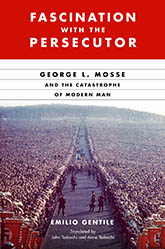|
Fascination with the Persecutor
George L. Mosse and the Catastrophe of Modern Man
Emilio Gentile
Foreword by Stanley G. Payne
Translated by John and Anne Tedeschi
George L. Mosse Series in the History of European Culture, Sexuality, and Ideas
Steven E. Aschheim, Skye Doney, Mary Louise Roberts, and David J. Sorkin, Series Editors
In 1933, George L. Mosse fled Berlin and settled in the United States, where he went on to become a renowned historian at the University of Wisconsin–Madison. Through rigorous and innovative scholarship, Mosse uncovered the forces that spurred antisemitism, racism, nationalism, and populism. His transformative work was propelled by a desire to know his own persecutors and has been vital to generations of scholars seeking to understand the cultural and intellectual origins and mechanisms of Nazism.
This translation makes Emilio Gentile’s groundbreaking study of Mosse’s life and work available to English language readers. A leading authority on fascism, totalitarianism, and Mosse’s legacy, Gentile draws on a wealth of published and unpublished material, including letters, interviews, lecture plans, and marginalia from Mosse’s personal library. Gentile details how the senior scholar eschewed polemics and employed rigorous academic standards to better understand fascism and the “catastrophe of the modern man”—how masculinity transformed into a destructive ideology. As long as wars are waged over political beliefs in popular culture, Mosse’s theories of totalitarianism will remain as relevant as ever.
Emilio Gentile is professor emeritus of history at Sapienza University in Rome. John Tedeschi is a Reformation historian, and Anne C. Tedeschi is a book conservator. Their many co-translated works include The Jews in Mussolini’s Italy by Michele Sarfatti and the award-winning The Cheese and the Worms by Carlo Ginzburg.
Praise
“Gentile is the scholar who has best succeeded in adopting and engaging Mosse’s research methodology and intuitions, and who has re-elaborated them with a good dose of originality in his celebrated studies on nationalism and the sacralization of politics.”
—Rivista storica italiana
“Choosing to let Mosse speak for himself, Gentile has tried (with great success) to reconstruct the complexity of Mosse’s historiographical trajectory from within.”
—Quaderni fiorentini per la storia del pensiero giuridico moderno
“Gentile draws an intellectual profile of Mosse. The book, which is thorough and written with astute empathy, does not limit itself to reconsidering Mosse’s principal historical studies but—where necessary—it widens the focus of attention.”
—Società italiana per lo studio della storia contemporanea
“A stellar contribution.”
—The Journal of Modern History
|

Larger images
December 2021
LC: 2021016505 D
224 pp. 6 x 9
|

